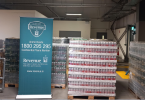Hoteliers & Insurance Alliance welcome government framework document

Hoteliers are calling for a range of measures that will allow businesses to plan now for their recovery.
Over the past few weeks, over 85% of hotels have closed and the majority of their 260,000 employees have been laid-off or put on short-time as a result of the Covid-19 crisis.
Tourism and hospitality have been a key driver of job growth over the last decade said the President of the Irish Hotels Federation Elaina Fitzgerald Kane, adding that with the right supports, they could play a significant role again in rebuilding the Irish economy.
“Tourism supports 11% of total employment nationally” she explained, “70% of these jobs are outside of Dublin which highlights the regional contribution of tourism and its vital role in spreading employment opportunities and prosperity across the entire country. It is essential that our industry remains to the fore of the national economic agenda.”
Welcoming the increases to the wage subsidy scheme that were announced separately by Minister for Finance Paschal Donohoe, Elaina Fitzgerald Kane said that while all supports are welcome, further measures are urgently required to protect tourism livelihoods and address the enormous challenges faced by the sector.
Hoteliers are calling for a range of measures that will allow businesses to plan now for their recovery. These include:
- Local Authority rates and water charges to be waived for a minimum period of 12 months
- cashflow & finance measures to assist with cashflow for businesses facing short-term problems including interest-free loans and a minimum 12-month deferment on senior debt (both Capital and Interest)
- taxation: tourism VAT rates to be reduced to zero for a minimum of 12 months and until the industry has recovered, then restored to 9% on a permanent basis. Employer’s PRSI to be reduced to 0.5% for a minimum of 12 months and until the industry has recovered
- government grants: business interruption grants to help businesses survive and reopen
- seasonal employees: supports for seasonal workers in tourism who do not currently qualify for Covid-19 related payments.
The IHF President noted the willingness of hotels to play their part in providing assistance to essential services where required by the HSE and other government departments.
She said that mitigating the impact of Covid-19 must go hand-in-hand with ensuring that Irish people have a viable economy to return to in the coming months.
“The health and wellbeing of all citizens is intertwined with the economy and people will need livelihoods after the crisis is over,” she said, adding that, “While most tourism and hospitality businesses are closed, they are working to secure the necessary funds to survive and restart. That process involves making predictions around the period of closure and the length of time it will take for various categories of revenue to recover.
“Government-controlled costs such as local authority rates, VAT and employer’s PRSI are having an enormously negative impact on viability scenarios during the recovery period. We recognise that the Government is being forced to increase the level of national debt to fund the health crisis and must protect the exchequer to fund ongoing services. “However, these urgent measures are required now to help our industry recover and play its part in ensuring that the Irish economy will be strong enough to service post-Covid-19 national debt.”
The Alliance for Insurance Reform has also welcomed the commitment to tackling the cost of insurance in the Policy Framework Document released by Fianna Fáil and Fine Gael.
The Alliance believes a reduction in insurance costs will be vital for businesses recovering following the Covid-19 restrictions.
“We welcome the commitment from Fianna Fáil and Fine Gael to tackling the cost of insurance in their Policy Framework Document,” said Alliance spokesman Peter Boland, “Insurance costs have been a huge burden on thousands of SMEs and community groups. Before the General Election all parties made commitments to insurance reform.
“We look forward to the parties involved in these discussions putting detail on this commitment and delivering urgent reform that will drive down premiums.”
Meanwhile the UK’s financial watchdog the Financial Conduct Authority has declined to intervene in the insurance dispute there over Coronavirus business interruption claims.
“Based on our conversations with the industry to date, our estimate is that most policies have basic cover, do not cover pandemics and therefore would have no obligation to pay out in relation to the Covid-19 pandemic,” stated the FCA’s Chief Executive Christopher Woolard recently, “While this may be disappointing for the policyholder we see no reasonable grounds to intervene in such circumstances. In contrast, there are policies where it is clear that the firm has an obligation to pay out on a policy. For these policies, it is important that claims are assessed and settled quickly.”
In the letter to the insurance sector he continued, “This is consistent with the wider objective of the authorities to support businesses and consumers during the current crisis.
“If there are reasonable grounds to pay part of a claim but not to make the payment of such claims in full, we would like you and your board to adopt an approach to making an interim payment.
“Many firms are already doing this. If you disagree with doing so, we would like you to send to us the grounds for reaching that decision including how you believe it represents a fair outcome for customers.”
In other countries too, regulatory authorities have urged insurers to treat customers fairly. However, reflecting Vintners Federation of Ireland’s thinking here, a number of Canadian businesses are taking a class action against insurers for breach of contract.









